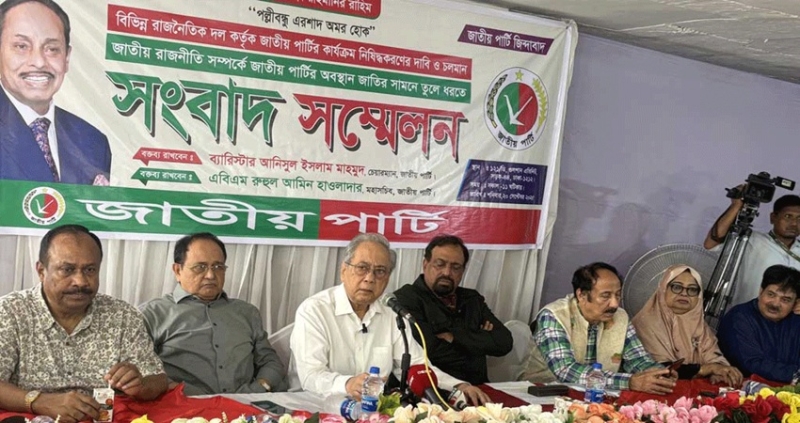- Govt reaffirms commitment to distribute school books by Jan |
- Dhaka’s air turns ‘unhealthy’ on Sunday morning |
- BD’s leather sector stuck at $1bn; could tap $5bn: Experts |
- RU suspends ward quota reinstatement amid student protests |
- Airports across Europe face disruptions due to cyberattack |
BNP, Jamaat Also Liable for 2014 Govt Legitimacy: JP Chief

Jatiya Party (JP) chairman Anisul Islam Mahmud was speaking at a press conference at Howladar Tower in Gulshan on Saturday,
Jatiya Party (JP) chairman Anisul Islam Mahmud has said that his party alone cannot be blamed for legitimising the Awami League government formed after the controversial 2014 national elections, stressing that BNP and Jamaat-e-Islami also bear significant responsibility.
Speaking at a press conference at Howladar Tower in Gulshan on Saturday, the JP chief rejected allegations that his party acted as a political ally to strengthen Awami League’s hold on power. “Critics often accuse us of collaborating with the Awami League and benefiting from it. But those who make these claims themselves carry heavier political baggage,” he said.
Anisul pointed out that BNP, Jamaat, and several other opposition parties took part in the 2018 national elections and various local government elections. “By participating in those polls, they indirectly validated the continuity of the 2014 government. They cannot absolve themselves of responsibility,” he noted.
He emphasised that Jatiya Party’s decision to join elections was guided by constitutional provisions, not political opportunism. “We are not a revolutionary party. We contest elections and play our role inside parliament to resist and criticise the government. That is our political philosophy,” he said.
The JP chairman also highlighted that BNP and Jamaat MPs were present in parliament during critical constitutional amendments but did not resign or stage a strong protest. “If they truly opposed the process, why did they remain in parliament instead of making a stand?” he asked.
On the issue of banning Jamaat’s activities, Anisul Islam Mahmud expressed surprise at the repeated calls from various political quarters. “We have never supported banning Jamaat. Our position is clear: they should be allowed to continue their political activities within the framework of law. Banning a political party is not a sustainable solution,” he added.
The press briefing was attended by several senior JP leaders, including Secretary General A B M Ruhul Amin Howladar, Executive Chairman Mujibul Haque Chunnu, Senior Co-Chairman Kazi Firoz Rashid, and Co-Chairman Syed Abu Hossain Babla.
Party insiders said the leadership felt it necessary to clarify JP’s position amid renewed debates over its past role and the legitimacy of the 2014 government. By shifting part of the responsibility onto BNP and Jamaat, the party aims to defend itself against accusations of being a “loyal opposition” during Awami League’s tenure.
Anisul concluded by saying that JP remains committed to constitutional politics, democratic reforms, and participating in elections as a means of safeguarding political stability in the country.

